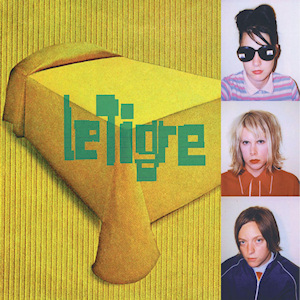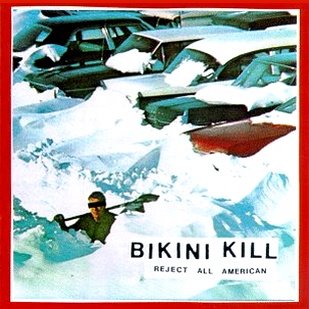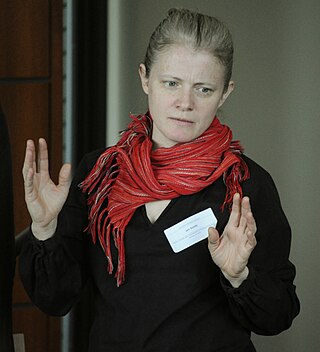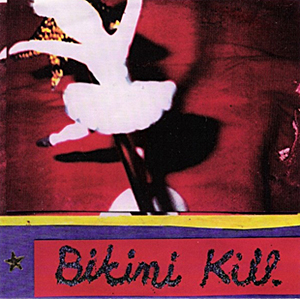
Bikini Kill is an American punk rock band formed in Olympia, Washington, in October 1990. The group originally consisted of singer and songwriter Kathleen Hanna, guitarist Billy Karren, bassist Kathi Wilcox, and drummer Tobi Vail.

Kathleen Hanna is an American singer, musician and pioneer of the feminist punk riot grrrl movement, and punk zine writer. In the early-to-mid-1990s, she was the lead singer of feminist punk band Bikini Kill, and then fronted the electronic rock band Le Tigre in the late 1990s and early 2000s. Since 2010, she has recorded as The Julie Ruin.
Tobi Celeste Vail is an American independent musician, music critic and feminist activist from Olympia, Washington. She was a central figure in the riot grrl scene—she coined the spelling of "grrl"—and she started the zine Jigsaw. A drummer, guitarist and singer, she was a founding member of the band Bikini Kill. Vail has collaborated in several other bands figuring in the Olympia music scene. Vail writes for eMusic.

Le Tigre is an American art punk and riot grrrl band formed by Kathleen Hanna, Johanna Fateman and Sadie Benning in 1998 in New York City. Benning left in 2000 and was replaced by JD Samson. They mixed punk's directness and politics with playful samples, eclectic pop, and lo-fi electronics. Like with many bands in and from the riot grrrl movement, many of the lyrics addressed feminist themes and ideas. The group also added multimedia and performance art elements to their live shows, which often featured support from like-minded acts such as the Need.

Johanna Rachel Fateman is an American writer, songwriter, musician, and record producer. She is a member of the post-punk rock band Le Tigre and founded the band MEN with Le Tigre bandmate JD Samson.

Julie Ruin is the debut solo album by Kathleen Hanna, released on September 29, 1998, through Kill Rock Stars. She recorded the album in 1997 whilst taking a break from Bikini Kill. Hanna recalled:
[It] was made as Bikini Kill was in breaking up, a guy who worked across the street from my apartment building was stalking me and I was being treated, in my own community, like a historical oddity. The solo record helped me remember that I was just a fucking person who liked being creative.

Adam Keefe Horovitz, popularly known as Ad-Rock, is an American rapper, guitarist, and actor. He was a member of the hip-hop group Beastie Boys. While Beastie Boys were active, Horovitz performed with a side project, BS 2000. After the group disbanded in 2012 following the death of member Adam Yauch, Horovitz has participated in a number of Beastie Boys-related projects, worked as a remixer, producer, and guest musician for other artists, and has acted in a number of films.

Tammy Rae Carland, is a photographer, video artist, zine editor, current provost at California College of the Arts (CCA), and former co-owner of the independent lesbian music label Mr. Lady Records and Videos. Her work has been published, screened, and exhibited around the world in galleries and museums in New York, Los Angeles, San Francisco, Berlin, and Sydney.

Le Tigre is the debut studio album of American music trio Le Tigre. It was released October 25, 1999, on Mr. Lady Records. The album combined pop music with the band's feminist political lyrics. It received positive reviews from music critics.

Reject All American is the second studio album by the American punk rock band Bikini Kill, released in 1996 by Kill Rock Stars.

Kathi Lynn Wilcox is an American musician. She is the bass player in Bikini Kill and guitar player in the Casual Dots. She was also a member of the Julie Ruin and the Frumpies.
Christina Billotte is an American singer, songwriter, and guitarist, known for her involvement in the punk music scene in Washington, D.C., as a performer and organizer. She is included in Venus Zine's list "The Greatest Female Guitarists of All Time".
Lucy Thane is a British documentary filmmaker, event producer and performer, living in Folkestone. Her films include It Changed My Life: Bikini Kill in the UK (1993) and She's Real (1997).
Viva Knievel was a short-lived punk rock and pre-riot grrrl band in Olympia, Washington, that existed around 1989–1990. Viva Knievel was Kathleen Hanna's second band, and included Zeb Olsen on bass, her brother, Stu, on guitar, and Matt Zodrow on drums. Kathleen's first band had been called "Amy Carter". Zeb, Stu, and Matt started playing punk rock in the early 80's and were in multiple bands before VK. Four Viva Knievel songs recorded in 1990 were released as a 7-inch EP on Cindy Wolfe's record label Ultrasound Records.

Jen Smith is an artist, musician, zine editor, and activist from the United States. Smith is credited with being the inspiration behind the term riot grrrl and being one of the architects of the movement.
Sini Anderson is an American film director, producer, performance artist, choreographer, dancer and poet, from Chicago, Illinois. Anderson is widely known for directing The Punk Singer (2013), a documentary about riot grrrl musician Kathleen Hanna's legacy and experience with late-stage Lyme disease.

"Rebel Girl" is a song by American punk rock band Bikini Kill. The song was released in three different recorded versions in 1993 – on an EP, an LP, and a 7-inch single. The single version was produced by Joan Jett and features her on guitar and background vocals. Widely considered a classic example of punk music, the song remains emblematic of the riot grrrl movement of the 1990s. In 2021, "Rebel Girl" was listed at number 296 on the updated list of Rolling Stone's 500 Greatest Songs of All Time.
Skinned Teen was a riot grrrl band from London, England, active in the early 1990s. They have been cited as an inspiration by Beth Ditto, Kathleen Hanna, Gina Birch and Josephine Olausson of Love Is All.
Riot grrrl is an underground feminist punk movement that began during the early 1990s within the United States in Olympia, Washington, and the greater Pacific Northwest, and has expanded to at least 26 other countries. A subcultural movement that combines feminism, punk music, and politics, it is often associated with third-wave feminism, which is sometimes seen as having grown out of the riot grrrl movement and has recently been seen in fourth-wave feminist punk music that rose in the 2010s. The genre has also been described as coming out of indie rock, with the punk scene serving as an inspiration for a movement in which women could express anger, rage, and frustration, emotions considered socially acceptable for male songwriters but less commonly for women.
Ramdasha Bikceem is an American writer, singer, and musician. She published the pioneering riot grrrl zine GUNK in the early 1990s, which explored intersections of race and gender in punk and skateboarding.












